- Home
- Ernest Hemingway
The Nick Adams Stories Page 3
The Nick Adams Stories Read online
Page 3
“I better go. I think Dad probably waited for me.”
“Well, get along then. Send Carl up to the house, will you?”
“All right.”
“Good night, Nickie.”
“Good night, Mrs. Garner.”
Nick went out the farmyard and down to the barn. Joe and Frank were milking.
“Good night,” Nick said. “I had a swell time.”
“Good night, Nick,” Joe Garner called. “Aren’t you going to stay and eat?”
“No, I can’t. Will you tell Carl his mother wants him?”
“All right. Good night, Nickie.”
Nick walked barefoot along the path through the meadow below the barn. The path was smooth and the dew was cool on his bare feet. He climbed a fence at the end of the meadow, went down through a ravine, his feet wet in the swamp mud, and then climbed up through the dry beech woods until he saw the lights of the cottage. He climbed over the fence and walked around to the front porch. Through the window he saw his father sitting by the table, reading in the light from the big lamp. Nick opened the door and went in.
“Well, Nickie,” his father said, “was it a good day?”
“I had a swell time, Dad. It was a swell Fourth of July.”
“Are you hungry?”
“You bet.”
“What did you do with your shoes?”
“I left them in the wagon at Garner’s.”
“Come on out to the kitchen.”
Nick’s father went ahead with the lamp. He stopped and lifted the lid of the icebox. Nick went on into the kitchen. His father brought in a piece of cold chicken on a plate and a pitcher of milk and put them on the table before Nick. He put down the lamp.
“There’s some pie, too,” he said. “Will that hold you?”
“It’s grand.”
His father sat down in a chair beside the oilcloth-covered table. He made a big shadow on the kitchen wall.
“Who won the ball game?”
“Petoskey. Five to three.”
His father sat watching him eat and filled his glass from the milk pitcher. Nick drank and wiped his mouth on his napkin. His father reached over to the shelf for the pie. He cut Nick a big piece. It was huckleberry pie.
“What did you do, Dad?”
“I went out fishing in the morning.”
“What did you get?”
“Only perch.”
His father sat watching Nick eat the pie.
“What did you do this afternoon?” Nick asked.
“I went for a walk up by the Indian camp.”
“Did you see anybody?”
“The Indians were all in town getting drunk.”
“Didn’t you see anybody at all?”
“I saw your friend, Prudie.”
“Where was she?”
“She was in the woods with Frank Washburn. I ran onto them. They were having quite a time.”
His father was not looking at him.
“What were they doing?”
“I didn’t stay to find out.”
“Tell me what they were doing.”
“I don’t know,” his father said. “I just heard them threshing around.”
“How did you know it was them?”
“I saw them.”
“I thought you said you didn’t see them.”
“Oh, yes, I saw them.”
“Who was it with her?” Nick asked.
“Frank Washburn.”
“Were they—were they—”
“Were they what?”
“Were they happy?”
“I guess so.”
His father got up from the table and went out the kitchen screen door. When he came back Nick was looking at his plate. He had been crying.
“Have some more?” His father picked up the knife to cut the pie.
“No,” said Nick.
“You better have another piece.”
“No, I don’t want any.”
His father cleared off the table.
“Where were they in the woods?” Nick asked.
“Up back of the camp.” Nick looked at his plate. His father said, “You better go to bed, Nick.”
“All right.”
Nick went into his room, undressed, and got into bed. He heard his father moving around in the living room. Nick lay in the bed with his face in the pillow.
“My heart’s broken,” he thought. “If I feel this way my heart must be broken.”
After a while he heard his father blow out the lamp and go into his own room. He heard a wind come up in the trees outside and felt it come in cool through the screen. He lay for a long time with his face in the pillow, and after a while he forgot to think about Prudence and finally he went to sleep. When he awoke in the night he heard the wind in the hemlock trees outside the cottage and the waves of the lake coming in on the shore, and he went back to sleep. In the morning there was a big wind blowing and the waves were running high up on the beach and he was awake a long time before he remembered that his heart was broken.
The Indians Moved Away
The Petoskey road ran straight uphill from Grandpa Bacon’s farm. His farm was at the end of the road, it always seemed, though, that the road started at his farm and ran to Petoskey, going along the edge of the trees up the long hill, steep and sandy, to disappear into the woods where the long slope of fields stopped short against the hardwood timber.
After the road went into the woods it was cool and the sand firm underfoot from the moisture. It went up and down hills through the woods with berry bushes and beech saplings on either side that had to be periodically cut back to keep them from effacing the road altogether. In the summer the Indians picked the berries along the road and brought them down to the cottage to sell them, packed in the buckets, wild red raspberries crushing with their own weight, covered with basswood leaves to keep them cool; later blackberries, firm and fresh shining, pails of them. The Indians brought them, coming through the woods to the cottage by the lake. You never heard them come but there they were, standing by the kitchen door with the tin buckets full of berries. Sometimes Nick, lying reading in the hammock, smelt the Indians coming through the gate past the woodpile and around the house. Indians all smelled alike. It was a sweetish smell that all Indians had. He had smelled it first when Grandpa Bacon rented the shack by the point to Indians and after they had left he went inside the shack and it all smelled that way. Grandpa Bacon could never rent the shack to white people after that and no more Indians rented it because the Indian who had lived there had gone into Petoskey to get drunk on the Fourth of July and, coming back, had lain down to go to sleep on the Pere Marquette railway tracks and been run over by the midnight train. He was a very tall Indian and had made Nick an ash canoe paddle. He had lived alone in the shack and drank pain killer and walked through the woods alone at night. Many Indians were that way.
There were no successful Indians. Formerly there had been—old Indians who owned farms and worked them and grew old and fat with many children and grandchildren. Indians like Simon Green who lived on Hortons Creek and had a big farm. Simon Green was dead, though, and his children had sold the farm to divide the money and gone off somewhere.
Nick remembered Simon Green sitting in a chair in front of the blacksmith shop at Hortons Bay, perspiring in the sun while his horses were being shod inside. Nick spading up the cool moist dirt under the caves of the shed for worms dug with his fingers in the dirt and heard the quick clang of the iron being hammered. He sifted dirt into his can of worms and filled back the earth he had spaded, patting it smooth with the spade. Outside in the sun Simon Green sat in the chair.
“Hello, Nick,” he said as Nick came out.
“Hello, Mr. Green.”
“Going fishing?”
“Yes.”
“Pretty hot day,” Simon smiled. “Tell your dad we’re going to have lots of birds this fall.”
Nick went on across the field back of the shop to the house to get his can
e pole and creel. On his way down to the creek Simon Green passed along the road in his buggy. Nick was just going into the brush and Simon did not see him. That was the last he had seen of Simon Green. He died that winter and the next summer his farm was sold. He left nothing besides his farm. Everything had been put back into the farm. One of the boys wanted to go on farming but the others overruled him and the farm was sold. It did not bring one half as much as everyone expected.
The Green boy, Eddy, who had wanted to go on farming, bought a piece of land over back of Spring Brook. The other two boys bought a poolroom in Pellston. They lost money and were sold out. That was the way the Indians went.
II ON HIS OWN
The Light of the World
When he saw us come in the door the bartender looked up and then reached over and put the glass covers on the two free-lunch bowls.
“Give me a beer,” I said. He drew it, cut the top off with the spatula and then held the glass in his hand. I put the nickel on the wood and he slid the beer toward me.
“What’s yours?” he said to Tom.
“Beer.”
He drew that beer and cut it off and when he saw the money he pushed the beer across to Tom.
“What’s the matter?” Tom asked.
The bartender didn’t answer him. He just looked over our heads and said, “What’s yours?” to a man who’d come in.
“Rye,” the man said. The bartender put out the bottle and glass and a glass of water.
Tom reached over and took the glass off the free-lunch bowl. It was a bowl of pickled pig’s feet and there was a wooden thing that worked like a scissors, with two wooden forks at the end to pick them up with.
“No,” said the bartender and put the glass cover back on the bowl. Tom held the wooden scissors fork in his hand. “Put it back,” said the bartender.
“You know where,” said Tom.
The bartender reached a hand forward under the bar, watching us both. I put fifty cents on the wood and he straightened up.
“What was yours?” he said.
“Beer,” I said, and before he drew the beer he uncovered both the bowls.
“Your goddam pig’s feet stink,” Tom said, and spit what he had in his mouth on the floor. The bartender didn’t say anything. The man who had drunk the rye paid and went out without looking back.
“You stink yourself,” the bartender said. “All you punks stink.”
“He says we’re punks,” Tommy said to me.
“Listen,” I said. “Let’s get out.”
“You punks clear the hell out of here,” the bartender said.
“I said we were going out,” I said. “It wasn’t your idea.”
“We’ll be back,” Tommy said.
“No you won’t,” the bartender told him.
“Tell him how wrong he is,” Tom turned to me.
“Come on,” I said.
Outside it was good and dark.
“What the hell kind of place is this?” Tommy said.
“I don’t know,” I said. “Let’s go down to the station.”
We’d come in that town at one end and we were going out the other. It smelled of hides and tan bark and the big piles of sawdust. It was getting dark as we came in and now that it was dark it was cold and the puddles of water in the road were freezing at the edges.
Down at the station there were five whores waiting for the train to come in, and six white men and four Indians. It was crowded and hot from the stove and full of stale smoke. As we came in nobody was talking and the ticket window was down.
“Shut the door, can’t you?” somebody said.
I looked to see who said it. It was one of the white men. He wore stagged trousers and lumbermen’s rubbers and a Mackinaw shirt like the others, but he had no cap and his face was white and his hands were white and thin.
“Aren’t you going to shut it?”
“Sure,” I said, and shut it.
“Thank you,” he said. One of the other men snickered.
“Ever interfere with a cook?” he said to me.
“No.”
“You interfere with this one,” he looked at the cook. “He likes it.”
The cook looked away from him, holding his lips tight together.
“He puts lemon juice on his hands,” the man said. “He wouldn’t get them in dishwater for anything. Look how white they are.”
One of the whores laughed out loud. She was the biggest whore I ever saw in my life and the biggest woman. And she had on one of those silk dresses that change colors. There were two other whores that were nearly as big but the big one must have weighed three hundred and fifty pounds. You couldn’t believe she was real when you looked at her. All three had those changeable silk dresses. They sat side by side on the bench. They were huge. The other two were just ordinary-looking whores, peroxide blondes.
“Look at his hands,” the man said and nodded his head at the cook. The whore laughed again and shook all over.
The cook turned and said to her quickly, “You big disgusting mountain of flesh.”
She just kept on laughing and shaking.
“Oh, my Christ,” she said. She had a nice voice. “Oh, my sweet Christ”
The two other whores, the big ones, acted very quiet and placid as though they didn’t have much sense, but they were big, nearly as big as the biggest one. They’d have both gone well over two hundred and fifty pounds. The other two were dignified.
Of the men, besides the cook and the one who talked, there were two other lumberjacks, one that listened, interested but bashful, and the other that seemed getting ready to say something, and two Swedes. Two Indians were sitting down at the end of the bench and one standing up against the wall.
The man who was getting ready to say something spoke to me very low, “Must be like getting on top of a hay mow.”
I laughed and said it to Tommy.
“I swear to Christ I’ve never been anywhere like this,” he said. “Look at the three of them.” Then the cook spoke up.
“How old are you boys?”
“I’m ninety-six and he’s sixty-nine,” Tommy said.
“Ho! Ho! Ho!” the big whore shook with laughing. She had a really pretty voice. The other whores didn’t smile.
“Oh, can’t you be decent?” the cook said. “I asked just to be friendly.”
“We’re seventeen and nineteen,” I said.
“What’s the matter with you?” Tommy turned to me.
“That’s all right.”
“You can call me Alice,” the big whore said and then she began to shake again.
“Is that your name?” Tommy asked.
“Sure,” she said. “Alice. Isn’t it?” she turned to the man who sat by the cook.
“Alice. That’s right.”
“That’s the sort of name you’d have,” the cook said.
“It’s my real name,” Alice said.
“What’s the other girls’ names?” Tom asked.
“Hazel and Ethel,” Alice said. Hazel and Ethel smiled. They weren’t very bright.
“What’s your name?” I said to one of the blondes.
“Frances,” she said.
“Frances what?”
“Frances Wilson. What’s it to you?”
“What’s yours?” I asked the other one.
“Oh, don’t be fresh,” she said.
“He just wants us all to be friends,” the man who talked said. “Don’t you want to be friends?”
“No,” the peroxide one said. “Not with you.”
“She’s just a spitfire,” the man said. “A regular little spitfire.”
The one blonde looked at the other and shook her head.
“Goddamned mossbacks,” she said.
Alice commenced to laugh again and to shake all over.
“There’s nothing funny,” the cook said. “You all laugh but there’s nothing funny. You two young lads, where are you bound for?”
“Where are you going yourself?�
� Tom asked him.
“I want to go to Cadillac,” the cook said. “Have you ever been there? My sister lives there.”
“He’s a sister himself,” the man in the stagged trousers said.
“Can’t you stop that sort of thing?” the cook asked. “Can’t we speak decently?”
“Cadillac is where Steve Ketchel came from and where Ad Wolgast is from,” the shy man said.
“Steve Ketchel,” one of the blondes said in a high voice as though the name had pulled a trigger in her. “His own father shot and killed him. Yes, by Christ, his own father. There aren’t any more men like Steve Ketchel.”
“Wasn’t his name Stanley Ketchel?” asked the cook.
“Oh, shut up,” said the blonde. “What do you know about Steve? Stanley. He was no Stanley. Steve Ketchel was the finest and most beautiful man that ever lived. I never saw a man as clean and as white and as beautiful as Steve Ketchel. There never was a man like that. He moved just like a tiger and he was the finest, free-est spender that ever lived.”
“Did you know him?” one of the men asked.
“Did I know him? Did I know him? Did I love him? You ask me that? I knew him like you know nobody in the world and I loved him like you love God. He was the greatest, finest, whitest, most beautiful man that ever lived, Steve Ketchel, and his own father shot him down like a dog.”
“Were you out on the coast with him?”
“No. I knew him before that. He was the only man I ever loved.”
Every one was very respectful to the peroxide blonde, who said all this in a high stagey way, but Alice was beginning to shake again. I felt it, sitting by her.
“You should have married him,” the cook said.
“I wouldn’t hurt his career,” the peroxide blonde said. “I wouldn’t be a drawback to him. A wife wasn’t what he needed. Oh, my God, what a man he was.”
“That was a fine way to look at it,” the cook said. “Didn’t Jack Johnson knock him out though?”
“It was a trick,” Peroxide said. “That big dinge took him by surprise. He’d just knocked Jack Johnson down, the big black bastard. That nigger beat him by a fluke.”
The ticket window went up and the three Indians went over to it.
“Steve knocked him down,” Peroxide said. “He turned to smile at me.”

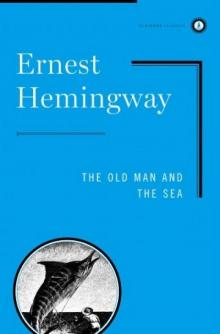 The Old Man and the Sea
The Old Man and the Sea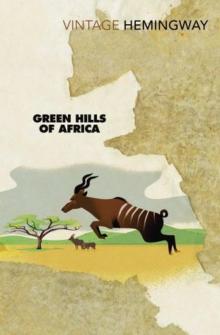 Green Hills of Africa
Green Hills of Africa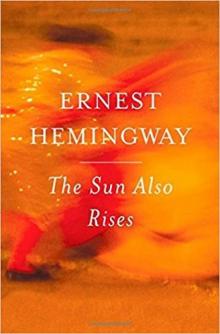 The Sun Also Rises
The Sun Also Rises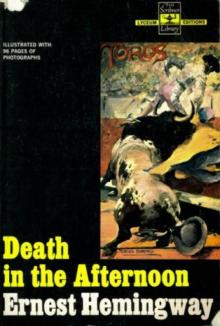 Death in the Afternoon
Death in the Afternoon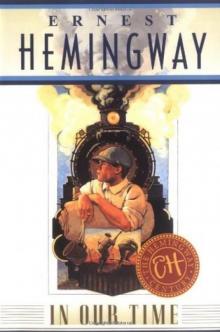 In Our Time
In Our Time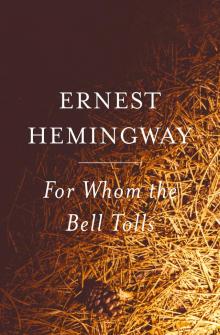 For Whom the Bell Tolls
For Whom the Bell Tolls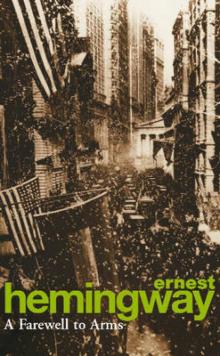 A Farewell to Arms
A Farewell to Arms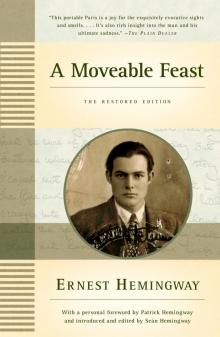 A Moveable Feast
A Moveable Feast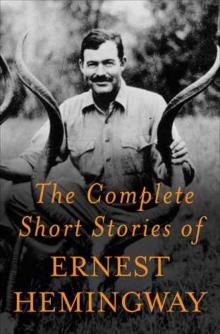 The Complete Short Stories of Ernest Hemingway
The Complete Short Stories of Ernest Hemingway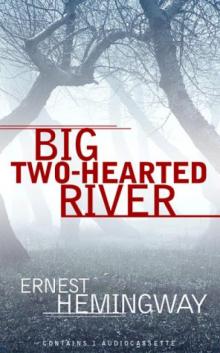 Big Two-Hearted River
Big Two-Hearted River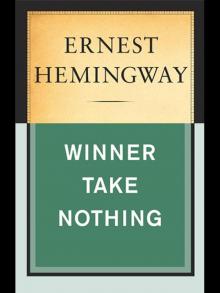 Winner Take Nothing
Winner Take Nothing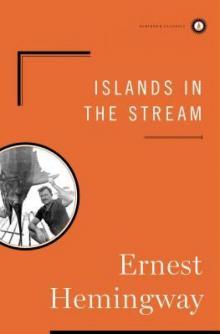 Islands in the Stream
Islands in the Stream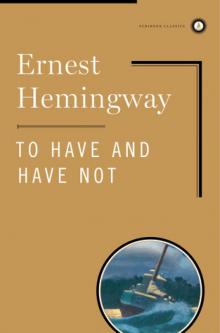 To Have and Have Not
To Have and Have Not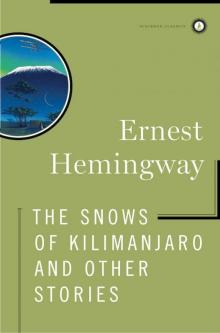 The Snows of Kilimanjaro and Other Stories
The Snows of Kilimanjaro and Other Stories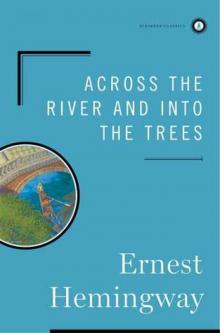 Across the River and Into the Trees
Across the River and Into the Trees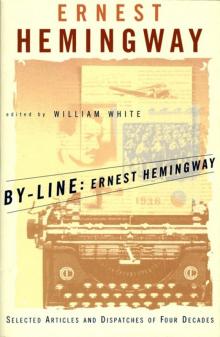 By-Line Ernest Hemingway
By-Line Ernest Hemingway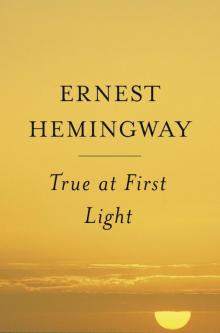 True at First Light
True at First Light Men Without Women
Men Without Women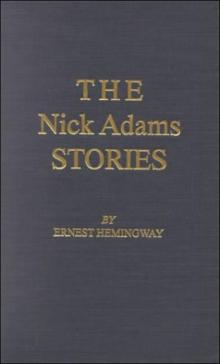 The Nick Adams Stories
The Nick Adams Stories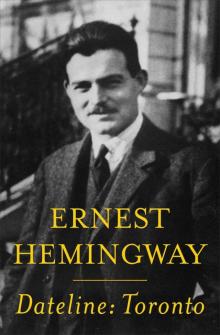 Dateline- Toronto
Dateline- Toronto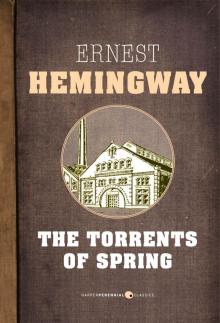 The Torrents of Spring
The Torrents of Spring Short Stories
Short Stories